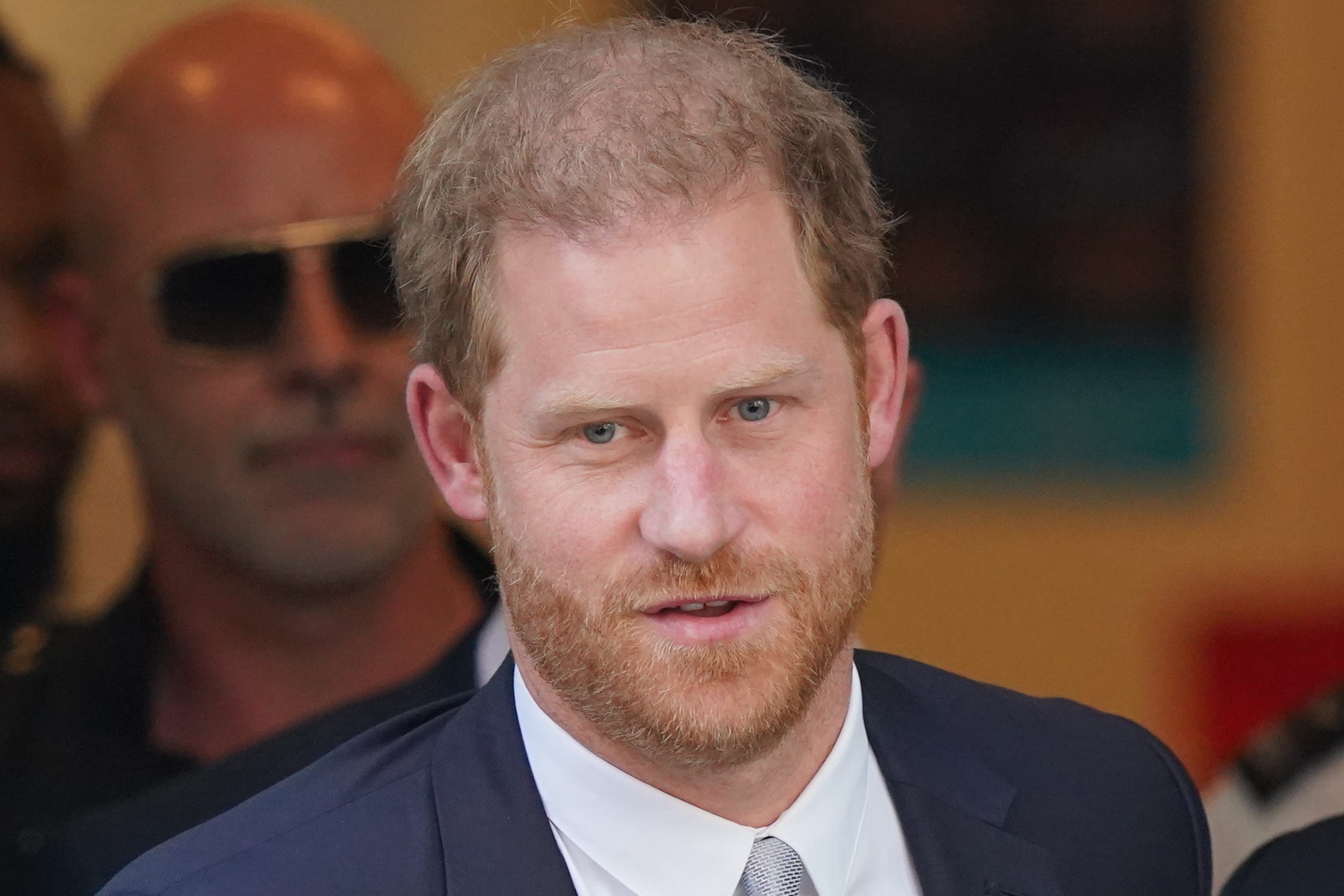Duke of Sussex entitled to £320,000 compensation in hacking case, lawyers say
Harry is suing publisher Mirror Group Newspapers over allegations of unlawful information gathering.

The Duke of Sussex should be awarded up to £320,000 in compensation over the alleged misuse of his private information by a tabloid newspaper publisher, his lawyers have told the High Court.
Harry, 38, is suing Mirror Group Newspapers (MGN) for damages, claiming journalists at its titles – the Daily and Sunday Mirror and Sunday People – were linked to methods including phone hacking, so-called “blagging” or gaining information by deception, and the use of private investigators for unlawful activities.
In a court document released to the media on Friday – the final day of a trial in London – the duke’s legal team set out its suggestions for the amount of money Harry could receive if a judge rules in his favour.
Harry alleges 147 stories from 1996 to 2010, published by MGN titles, used information obtained through unlawful means.
The articles cover the duke’s relationship with his family and ex-girlfriend Chelsy Davy, a few injuries and illnesses, his military service and allegations of drug use.
Some 33 articles, dated between 1996 and 2009, were selected for examination during the trial of Harry’s and others’ contested claims against the publisher.
In the document, the duke’s lawyers suggested he could be awarded up to £320,000 if his case is successful in relation to all of these 33 stories.
The duke may also be awarded more if the judge, Mr Justice Fancourt, concludes Harry is also entitled to “aggravated damages”, for additional distress or injury to feelings arising from the nature of the alleged wrongdoing.
Harry has previously told the court that MGN’s alleged intrusion into his life contributed to “a huge amount of paranoia” in his relationships.
In his witness statement, the duke said that he found it “very hard to trust anyone, which led to bouts of depression and paranoia”.
The highest amount sought for one article is £25,000 in relation to a December 2003 story in the People.
The double-page article reported a disagreement between Harry and his brother William, now Prince of Wales, about whether to meet former royal butler Paul Burrell over his “ongoing exposes about our mother”.
Harry claims the article’s author was a “habitual commissioner of private investigators” and that the reported phrase “two-face shit” he used to describe Mr Burrell could have been taken from a voicemail.
MGN has claimed the information came from a “confidential source who specialised in royal matters” and there was no evidence of phone hacking.
Harry’s lawyers also suggest he could be awarded up to £20,000 in relation to a front page Mirror story in January 2002 entitled “Harry’s cocaine ecstasy and GHB parties”.
The article claimed that some of the duke’s friends had taken “hard drugs” in front of him, including ecstasy, cocaine and GHB, reporting that the then Prince of Wales – now the King – was “terrified”.
Harry said in his evidence to the court that “it is not clear to me where the defendant’s journalists could have possibly obtained these quotes from”.
However, MGN deny unlawful activity and said there is no evidence of phone hacking.
MGN has told the trial that it denies that 28 out of the 33 articles involved unlawful information gathering and that it was not admitted for the remaining five articles.
The publisher claims the stories came from a range of sources, including information disclosed by royal households or other royals, freelance journalists and news agencies as well as confidential sources with “extensive” royal contacts.
Its lawyers have said the duke should be awarded up to £500 in damages for one admitted instance of unlawful information gathering in February 2004.
Andrew Green KC, for MGN, previously told the trial that it “unreservedly apologises” to the duke for this occasion and that it accepts he was entitled to “appropriate compensation”.
The barrister said that it was admitted that a private investigator was instructed, by an MGN journalist at The People, to unlawfully gather information about his activities at the Chinawhite nightclub one night in February 2004.
Mr Green said that there was a People article published in February 2004 “giving the recollection of a woman Harry spent time with” at the club, but later told the court that it was not one of the 33 stories selected for the trial of Harry’s claim, “so it is not alleged that this instruction led to the publication of his private information”.
The barrister also said MGN had set out the “appropriate award” should the judge find any of the articles complained of were the product of unlawful activity.
According to Harry’s lawyers, MGN had suggested a potential total figure of £37,000.
MGN lawyers have also argued that there is “nothing significant” in Harry and others’ claims “to warrant any award of aggravated damages”.
In written arguments they add that the court should ensure any award is “proportionate”, saying that figures proposed by the claimants “would be grossly disproportionate given the absence of evidence and relatively limited interference in their private lives”.
Harry’s case is being heard alongside similar claims by actor Michael Turner, who is known professionally as Michael Le Vell and best known for playing Kevin Webster in Coronation Street, actress Nikki Sanderson and comedian Paul Whitehouse’s ex-wife Fiona Wightman.
MGN is largely contesting the claims and denies that any of the articles complained of resulted from phone hacking, while contending that the vast majority did not arise from any other unlawful activity.
